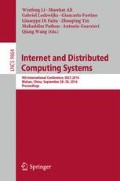Abstract
In this paper, we study energy management problems in communities with several neighborhood-level Residential Energy Systems (RESs). We consider control problems from both community level and residential level to handle external changes such as restriction on peak demand of the community and the total supply by the electricity grid. We propose three policies to handle the problems at community level. Based on the collected data from RESs such as predicted energy load, the community controller analyzes the policies, distributes the results to the RES, and each RES can then control and schedule its own energy load based on different coordination functions. We utilize a framework to integrate both policy analysis and coordination of functions. With the use of our approach, we show that the policies are useful to resolve the challenges of energy management under external changes.
Access this chapter
Tax calculation will be finalised at checkout
Purchases are for personal use only
Notes
- 1.
Currently, our framework only combines the external weather data to show the concept. More data can be combined to improve the accuracy of our analysis.
- 2.
Notice that two or more policies may specify different destinations under the same condition. The current implementation provides two solutions to solve local and global conflicts. However, in our existing implementation, policies are defined without any conflicts between them.
References
Eia, U.: Annual energy outlook 2015 with projections to 2040 (2015)
Ropp, M., Gonzalez, S., Schaffer, A., Katz, S., Perkinson, J., Bower, W.I., Prestero, M., Casey, L., Moaveni, H., Click, D., et al.: Newblock solar energy grid integration systems: final report of the florida solar energy center team. Technical report, Sandia National Laboratories (2012)
Werth, A., Kitamura, N., Tanaka, K.: Conceptual study for open energy systems: distributed energy network using interconnected DC nanogrids. IEEE Trans. Smart Grid 6(4), 1621–1630 (2015)
Shao, S., Jahanbakhsh, F., Agüero, J.R., Xu, L.: Integration of PEVs and PV-DG in power distribution systems using distributed energy storage - dynamic analyses. In: ISGT, pp. 1–6 (2013)
Moslehi, K., Kumar, R.: A reliability perspective of the smart grid. IEEE Trans. Smart Grid 1(1), 57–64 (2010)
Erol-Kantarci, M., Mouftah, H.T.: Wireless sensor networks for cost-efficient residential energy management in the smart grid. IEEE Trans. Smart Grid 2(2), 314–325 (2011)
Mohsenian-Rad, A.H., Leon-Garcia, A.: Optimal residential load control with price prediction in real-time electricity pricing environments. IEEE Trans. Smart Grid 1(2), 120–133 (2010)
Pedrasa, M.A.A., Spooner, T.D., MacGill, I.F.: Coordinated scheduling of residential distributed energy resources to optimize smart home energy. IEEE Trans. Smart Grid 1(2), 134–143 (2010)
Molderink, A., Bakker, V., Bosman, M.G.C., Hurink, J.L., Smit, G.J.M.: Management and control of domestic smart grid technology. IEEE Trans. Smart Grid 1(2), 109–119 (2010)
Pipattanasomporn, M., Kuzlu, M., Rahman, S.: An algorithm for intelligent home energy management and demand response analysis. IEEE Trans. Smart Grid 3(4), 2166–2173 (2012)
Werth, A., Kitamura, N., Tanaka, K.: Evaluation of centralized and distributed microgrid topologies and comparison to open energy systems. In: EEEIC, pp. 492–497 (2015)
Worthmann, K., Kellett, C.M., Braun, P., Grüne, L., Weller, S.R.: Distributed and decentralized control of residential energy systems incorporating battery storage. IEEE Trans. Smart Grid 6(4), 1914–1923 (2015)
Mineno, H., Kato, Y., Obata, K., Kuriyama, H., Abe, K., Ishikawa, N., Mizuno, T.: Adaptive home/building energy management system using heterogeneous sensor/actuator networks. In: CCNC, pp. 1–5 (2010)
Bulusu, N., Estrin, D., Girod, L., Heidemann, J.: Scalable coordination for wireless sensor networks: self-configuring localization systems. In: ISCTA (2001)
Johnson, C.W.: Analysing the causes of the Italian and Swiss blackout. In: SCS 28th September 2003 (2007)
Cowie, J.H., Ogielsk, A.T., Premore, B., Smith, E.A., Underwood, T.: Impact of the 2003 blackouts on internet communications. Technical report, Renesys Corporation (2003)
Ferc, N.: Arizona-southern california outages on 8 September 2011: causes and recommendations. Technical report, Federal Energy Regulatory Commission and the North American Electric Reliability Corporation (2012)
Acknowledgment
Sisi Duan is supported by UT-Battelle, LLC under Contract No. DE-AC05-00OR22725 with the U.S. Department of Energy. The United States Government retains and the publisher, by accepting the article for publication, acknowledges that the United States Government retains a non-exclusive, paid-up, irrevocable, world-wide license to publish or reproduce the published form of this manuscript, or allow others to do so, for United States Government purposes. The Department of Energy will provide public access to these results of federally sponsored research in accordance with the DOE Public Access Plan (http://energy.gov/downloads/doe-public-access-plan).
Author information
Authors and Affiliations
Corresponding author
Editor information
Editors and Affiliations
Rights and permissions
Copyright information
© 2016 Springer International Publishing AG
About this paper
Cite this paper
Duan, S., Sun, J. (2016). Energy Management Policies in Distributed Residential Energy Systems. In: Li, W., et al. Internet and Distributed Computing Systems. IDCS 2016. Lecture Notes in Computer Science(), vol 9864. Springer, Cham. https://doi.org/10.1007/978-3-319-45940-0_11
Download citation
DOI: https://doi.org/10.1007/978-3-319-45940-0_11
Published:
Publisher Name: Springer, Cham
Print ISBN: 978-3-319-45939-4
Online ISBN: 978-3-319-45940-0
eBook Packages: Computer ScienceComputer Science (R0)

